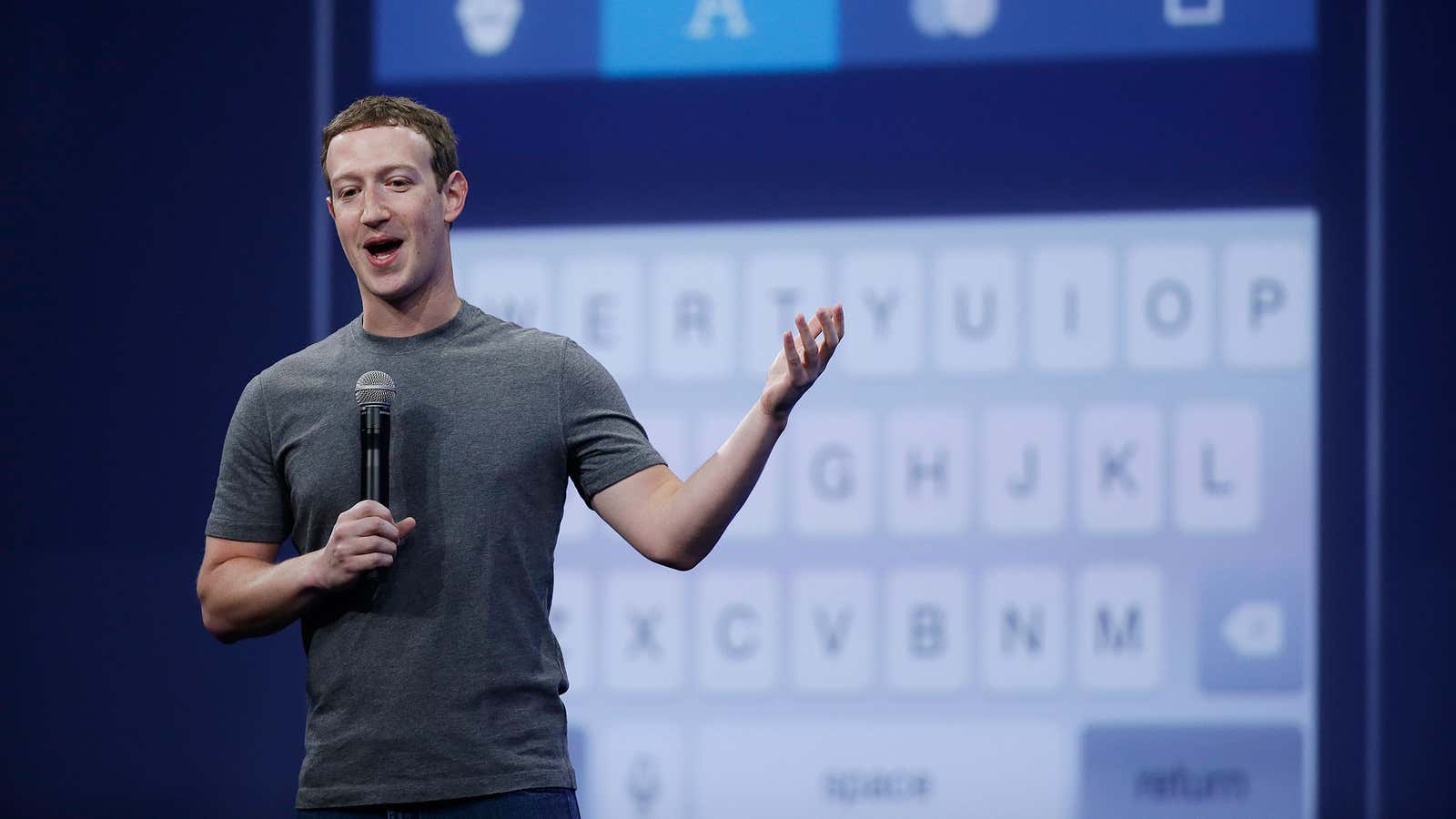If Facebook were just an advertising company, it would still be the tech behemoth it is today—but a lot less interesting.
Over its 12-year history, CEO Mark Zuckerberg has reshaped Facebook from a social network into a platform of platforms.
To be sure, it’s the ad business that fuels Facebook’s grand ambitions. Its mission statement is to connect everyone in the world (and to show ads to every last one of them). Beyond that, it’s made a $2 billion gamble on virtual reality, transformed its chat app into a robust platform capable of much more than sending text, and is testing a drone capable of beaming internet to parts of the world lacking it.
For each of these projects, Facebook has created a new platform. By defining the standards for developers to build external applications on top of, Facebook has become bigger than Facebook itself. Its platforms are appealing to developers given Facebook’s trove of social data from more than 1.59 billion users. With Oculus in particular, Zuckerberg saw the opportunity to be ahead of, and accelerate, a forthcoming computing platform, defining how the next generation will access and interact with information.
For platforms to succeed, companies need outside developers to buy into their ecosystems. Yahoo and Microsoft both recently had their opportunities to appeal to developers, and Zuckerberg will do the same next week, making the case for why they should build for Facebook’s various platforms at its F8 conference.
Exactly what will take place at the two-day conference, which starts April 12 in San Francisco, remains shrouded in secrecy. But the schedule provides clues on the big themes likely to emerge from F8:
Oculus
Two years ago, when Facebook paid $2 billion for VR startup Oculus, the world finally took virtual reality seriously.
Two weeks ago, Oculus founder Palmer Luckey personally delivered the first headset to a developer in Alaska, enthusiastically declaring in a Facebook post afterward: “We did it!”
There are only two VR-related panels on the schedule so far, but it would seem silly for Facebook to not put Oculus under the spotlight given the timing. Furthermore, Michael Abrash, Oculus chief scientist, gave a dazzling optical illusion-filled keynote the second-day of F8 last year.
Zuckerberg has said he considers virtual reality the next major computing platform, but he’s warned that mainstream adoption could “take five, seven, 10, I don’t know, maybe 12 years.”
Still, analysts are already expecting big numbers. Deutsche Bank, for example, is forecasting $600 million (but no profit) in hardware revenue and $35 million in app store revenue for Facebook this year.
Messenger
Messenger has been Facebook’s breakout success. Though the company initially faced backlash for separating chat functionality from its flagship app, users soon came to embrace the standalone Messenger. The chat app became so popular it has been downloaded more than Facebook’s big blue app. Just yesterday (April 6), the company announced that Messenger hit 900 million monthly active users. In February, Facebook’s other chat app, WhatsApp, said it had 1 billion users.
At last year’s F8 conference, the company revealed the motivation for Messenger’s split. Like its Asian counterparts WeChat, Kakao, and Line, Messenger became a full-fledged platform. Facebook users could send GIFs, transfer money to their friends, talk to customer service reps, and buy products without ever having to leave the app. The greatest potential for revenue is shopping via chat, what some are terming “conversational commerce.”
This year, Facebook will debut more ways to let people buy products via Messenger. ”Nine hundred million users suggests something really powerful in terms of an audience,” the chief executive of an upcoming Messenger commerce partner said in an interview. In the days leading up to F8, The Information discovered references to “suggested businesses” in Messenger’s source code, and Business Insider found and chatted with some of these businesses in the app.
With chat bots the buzzy topic of the moment—just last week Microsoft CEO Satya Nadella said at its developer conference that “bots are the new apps”—Facebook is expected to debut APIs that let developers build chatbots and buttons that direct users from a website to Messenger, where they can talk to a customer service rep.
The Next Billion
For Facebook to connect everyone in the world, everyone needs to be online.
With the company nearing saturation in North America and Europe, Facebook is eyeing Asia as well as Africa, the Middle East, and Latin America to drive user growth. Billions of people still don’t have internet access, so Facebook is partnering with local wireless carriers to provide what it calls Free Basics, a limited version of the internet that it provides for free. (Facebook is also getting ready to deploy Aquila, its internet-beaming drone.)
Free Basics’s walled garden is yet another Facebook platform. Companies apply to be featured as a website that users can access for free, and a session at F8 will showcase developers who have used the platform to reach a wider audience.
This walled garden is why Facebook’s Internet.org has been so polarizing. In February, India banned Free Basics for violating net neutrality, a principle that dictates telecom operators provide people with equal access to the internet. One million users in India opened the app 18 days a month before the ruling, according to app analytics firm Sensor Tower.
The setback isn’t deterring Facebook. In October, the company implemented 2G Tuesdays at its headquarters, simulating a slow connection so employees understand what the internet is like for its users in developing countries. It’s also optimized its news feed and created a stripped-down version of the social network called Facebook Lite, the subject of another F8 panel, that loads quickly over slower connections.
Facebook is clearly thinking about the next billion people coming online and wants its developers to do the same.
